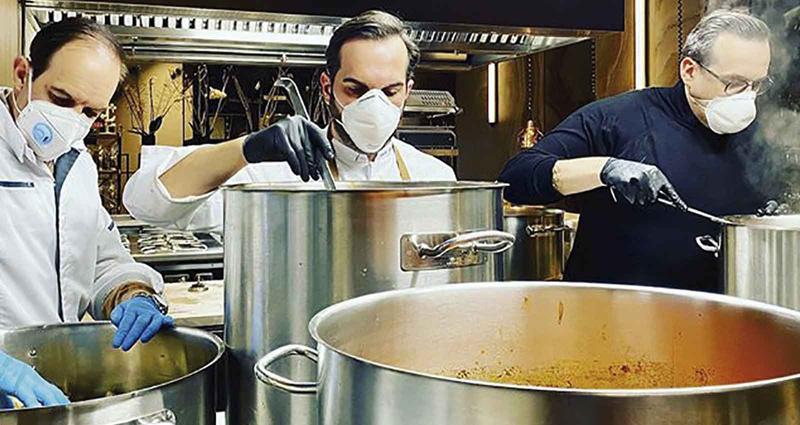Spanish chefs analyze the future that awaits the hospitality industry. A piece of information for hope: reservations for the month of April 2021 at the Celler de Can Roca were closed after a few minutes.
Uncertainty, patience, fear, adaptation, work, trust, superficiality, struggle, hope, reinvention, creativity, effort, liquidity, talent, illusion... These are the words most repeated by the Spanish chefs with whom we have spoken about the future of haute cuisine after COVID19.
What will the day after be like? The moment when the doors of the restaurants open again and the kitchens light up the stoves is still a distant scenario. When and how we will return to normality after this long period of hibernation are two unknowns. No one is sure that the world will go back to the way it was, although most want it.
Between fear and illusion
This report is a summary of the answers that several chefs have given to the questionnaire that we sent them about the future of haute cuisine and other factors that affect the day after in the hospitality industry . We asked them how they imagined going back to work; what worried them the most; if the teams would be prepared to face the new situation; If they considered the response of the institutions to the specific needs of the hospitality sector sufficient, if haute cuisine has a future...
Everyone perceives a mixture of illusion, fear and prudence. Also trustworthy in a sector, the hotel industry in general and haute cuisine in particular, accustomed to hard work, who has always shown the ability to adapt and a lot of imagination when facing crises. Everyone recognizes that new codes will be generated, that there will be a return to what is essential, to what is truly authentic, and that those who opted for the superfluous will stay by the wayside, including those with weaker business structures. They are aware that nothing is in their hands and that the weakest link in this crisis is the hotel industry in all its aspects, from the bar to the nightclubs.
Skepticism and optimism
“I can't imagine going back to work. The context will not exist to want to go to a restaurant” says Ricard Camarena (Ricard Camarena. Valencia). We all have distrust and with distrust you cannot enjoy. What is at risk is the hospitality model. It is not about bars or haute cuisine. Even if we enlarge the spaces, what will happen to the waiters, do they have to go from one table to another? The only future I see is that the kitchen reaches homes, delivery, but that is at odds with quality as I understand her. Our world is very fragile. We have done few things that travel well, cokes and little else. How are we going to make gastronomic dishes reach homes? They are too ephemeral. What is being proposed is that the hospitality industry does not return until there is a vaccine and that is at least 18 months ”.
Ricard Camarena
Susi Díaz (La Finca. Alicante) prefers to see the bottle half full “I am confident that once we overcome this situation the exit will be quick. May we regain confidence soon and see the establishments full again. It's about leaving this behind as a parenthesis in our lives."
Susi Diaz
Andoni L. Aduriz (Mugaritz. Guipúzcoa) explains “in my mind I draw a complicated scenario, with a lot of uncertainty, but at the same time with a lot of determination to move forward. Now we have to be more Mugaritz than ever and make creativity our main tool to navigate the complexity that awaits us”. While the brothers Javier and Sergio Torres (Torres Cocina) do not lose heart "we are preparing to return full of desire and enthusiasm" Dabiz Muñoz (DiverXo. Madrid) prefers not to comment "I see nothing more than speculation that does not help anything and only generates restlessness and restlessness. At the moment I am reflecting and observing. Making decisions to move forward with my three restaurants and their workers”.
A new scenario and a lot of concern
Mario Sandoval (Coque. Madrid) believes that “a new era is beginning, perhaps a new normality”. Quique Dacosta (Quique Dacosta), who is optimistic by nature, also finds it difficult: “If we put ourselves in the most catastrophic circumstances, many business models (not only hotels and restaurants) can close permanently. But the answers or reflections will come when we can finally leave home and experience firsthand what all this has in store for us. What worries me fundamentally is that there is no vaccine. I am concerned about the deaths and the destruction of jobs.”
What worries Pedro Sánchez (Bagá. Jaén) the most is "the situation in which many friends of the profession will find themselves, those who will not be able to open again." And Lucía Freitas, from Galicia (To Tafona. La Coruña) he is tormented by “losing the quality of life that has cost me so many years to achieve for my team, I don't want them to have to go through everything that I had to go through”. Ángel León (Aponiente. Cádiz) assures that he imagines the day after “with great fear. When the state of alarm is over and the payrolls return to Aponiente, how am I going to deal with 66 payrolls with an empty restaurant? I'm going crazy. That is why I have started cooking for others (he has joined the WCK team together with Juanlu Fernández from Maison Lu and they have set up a kitchen in the mill) which is now the important thing”.
- Angel Leon
- Pedro Sanchez
Time is ticking
Eneko Atxa (Azurmendi. Vizcaya) "I would have appreciated that during the duration of this quarantine, from the institutions (I know that they are prioritizing other types of more important things at this time and This is how it should be) different scenarios and regulations on issues related to health and safety, tourism, hospitality, etc. would have been considered. to be able to work on it during all this labor paralysis. The fear I have is that in the face of such great uncertainty, different regulations will be generated that change every two by three.

Joan Roca (El Celler de Can Roca. Girona) points in the same direction “Everything worries us. I imagine the return staggered. We hope they give us dates soon. Our sector will not be one of the first to open, the facilities will have to be adapted, the capacity will be reduced. That worries me a lot. Also that hygiene standards will have to be maximized... We sense the answers, but we don't have specific data to start working.
Joan Roca
Francis Paniego (El portal de Echaurren. La Rioja) maintains that “the client's response is total uncertainty. But I worry more, that there is a first feeling of recovery, but then it falls into a long depression caused by another outbreak or because the global economy collapses.
For Begoña Rodrigo (La Salita. Valencia) it will be a time of coupling to an unknown scenario, but I face it as a challenge and as such, I like it. Honestly, nothing worries me beyond being able to keep my entire squad, the rest will be a new version of what has been done so far, work, work and work”.
Begoña Rodrigo
Javier Olleros (Culler de Pau. Pontevedra) imagines the day after “as the fruit of a great learning experience, from a green perspective and responsible with the planet. He worries me above all about the social inequality that is going to be generated by the crisis and the situation in which our elders are going to be left. The time that the break lasts and the economic wear and tear, which will be key to the comeback. I am also concerned about how we can keep the ship (Culler) afloat, we are 14 people working here and the restaurant has to be profitable”.
How will customers respond?
Reduction in capacity, lack of liquidity, fear on the part of the public to return to restaurants... These are the three ghosts that hover over the sector.
For Joan Roca “the most important thing is how to generate trust so that the customer returns to the restaurant. There is a real and encouraging data. When we opened reservations for April 2021 on March 31, they filled up at the usual speed. We were a little scared to see what would happen, but what had been normal until then happened. That means that the customer is still interested in coming to the restaurant. Now, the main thing is to give the feeling that restaurants are safe places to go. We have to do that, but the administration also has to help us by spreading the word that the premises that are open (when they open) have all the necessary hygienic-sanitary measures, which are rigorous and things are being done well. Conveying that things are being done well will be key. Fear is fought with confidence.
Jesús Sánchez (El Cenador de Amós. Cantabria) points out along the same lines. We are confident in the response of the clientele who, to date, continue to maintain their reservations, even new reservations are arriving every day. I am concerned about tourism, on which a large part of haute cuisine depends, but I hope the absence of tourists is temporary”.
According to Andoni Aduriz, there will be a certain part of the population that will be immersed in a kind of psychosis with many doubts and fears. There will be a lot of contrast and many paradoxes, but people are social animals and we want to continue consuming leisure. However, the ice cream maker Fernando Sáez (Della Sera. La Rioja) points out that the main problem will be society's fear of sharing spaces. To which Pedro Sánchez opposes the theory that “human beings need to escape, learn, travel, enjoy… Only then will they return to normality. Our nature is like that, humanity has gone through fateful times and it has always, always known how to recover”.
Andoni Aduriz
Different answers for different realities
Quique Dacosta reflects on the different business models and the different answers “you can't compare Quique Dacosta Restaurante with El Poblet, or Vuelve Carolina or Mercatbar with Llisa negra or ArrosQD . Neither Spain with London. In the end you have to see how people move. We are surely going to have to restructure the business models precisely because of this presumable reduction in capacity and number of diners, because of how consumer behavior is, etc. We analyze and will continue to analyze these situations to adapt to the circumstances. But the key and where the reflection should be is “for how long”. Will it be until the end of 2020? Are we going to be able to hold out for eight months? Will the customer have money to go out to restaurants if jobs are destroyed? What will be the adaptability of the client's behavior to the restrictions? Not only restaurants are in danger but the entire production chain involved in this sector”.
The viability of the businesses at stake
For Begoña Rodrigo "the reduction in capacity is going to be a complicated point, not because of space, but in high-end stores kitchen is not a problem, but because we will have to maintain the same equipment (according to the ERTE we have to assume the staff we had on March 14)". For Susi Díaz, the bars are going to suffer, but "in Spain the bars are a way of life. I think that many of us who are confined, the first thing we plan to do when this is over is to get together with our good friends in the usual bar. “There are structures designed for certain capacities, it does not affect me in the gastronomic restaurant (I have space for 100 and 30 days), but Canalla will have a difficult viability. Costs will increase and revenues will decrease. We will have to rethink everything. How will Central Bar survive in the Valencia market?” asks Ricard Camarena.
The Galician Lucía Freitas also points to the lack of liquidity as one of the big problems, "it will affect us all a lot, but it is true that restaurants with less experience in time will suffer even more to be able to face the situation. We are all going to have a bad time, and not all of us will "live" to tell about it. Small restaurants with very tight proposals and little margin (in this case I include the vast majority of Galician gastronomy) will suffer a lot to maintain quality. But I also believe that this eagerness to enjoy and look for something further in gastronomy will not be lost, it will only moderate temporarily”.
Lucia Freitas
Popular but little respected
Joan Roca points out that "What will affect the rest of the capacity the most is the issue of liquidity of the companies, but I think that this will not be the great problem. I believe that it is convenient for the State to keep business structures and their ecosystems alive. The government is looking for all possible formulas and will have to encourage banks so that credit can be accessed. However, Begoña Rodrigo does not see it so clearly: “I think that measures have been taken, but not the right ones, as always, the hospitality sector has been suffering for years from little empathy towards an essential sector in this country. I have always said that we have managed to be very popular, which does not mean that we are a respected guild, if so, our problems would not be patched.
Javier Olleros points to the heterogeneity of businesses: “We are facing something unknown to everyone and it will have to be a new starting point. There are many projects that have just started, that are going very tightly and these are the ones that have it the most difficult, that is why it is important that the aid be from the bottom up. There are stores that, because they are very small, will find it difficult to reduce space and large stores that will have to reduce staff, solutions will have to be adapted to the problems”.
Javier Olleros
A chain crisis
For Nacho Manzano, the problem is general and affects many sectors, “the first thing is to deal with the health crisis, but then the government will have to listen to us . Our activity plays a fundamental role in this country, economically of course, but also as a brand and this is another incalculable value, we must seriously make ourselves heard. For many reasons, a responsible government cannot fail to keep pace with the hospitality industry in this country”. Ángel León is aware that “at the sectoral level we are blocked because we have put aside our problems to make way for healthcare, which is now what is important. Then there has to be a claim, when there are no people in the bars and restaurants things will be different. There will be a lot of pain in the sector. And our suppliers will also suffer. It's a chain."
Nacho Manzano
The brothers Sergio and Javier Torres point in the same direction «We should act now, with respect and prudence, but start thinking about a plan for the sector as people from the world of culture have already done, for example» . Along the same lines, Jesús Sánchez qualifies that “there is no doubt that we will have to be vigilant and defend our sector. Of course, let's be supportive, it is an entire society that is affected and that must be rescued ”.
New solutions for an unprecedented situation
Francis Paniego believes that “you have to empathize with the administration. This is an unprecedented situation and although at first I felt very, very indignant, I believe that little by little they are arriving and I want to believe that the appropriate measures will arrive. There is no doubt that many businesses will fall, but I do not believe that the disappearance of a strategic sector for our country will be allowed”.
Francis Paniego
For Fernando Sáez“there is a lack of cohesion in the sector, gastronomy is a chain, from the one that grows to the moment in which a client is going to enjoy a preparation. There are many links and not all of them are always present when presenting actions or sitting down with the administration. A platform is needed that dignifies and listens to all parties”.
Angelines and Fernando
Saving the ship or turning it into a submarine
Ángel León is sure that “the world will stop for a while. For a year and a half we will live as we can from national tourism. In Aponiente there are 60% of foreign clients and we are in Cádiz. We have to learn to survive. You have to lose as little as possible and borrow as little as possible. We will save the ship and if we can't, we will turn it into a submarine." In the opinion of Susi Diaz, "the economic impact on the sector is going to be very large and that affects the future of haute cuisine. More about those establishments that we live, in part, from tourism. All the measures that are taken will be few, so I encourage all the administrations and associations to work together”.
Mario Sandoval believes that there will be a significant change in the way of enjoying gastronomy “in the same way that many work protocols and many other social activities will change. I think that what is coming is an evolution towards the digital world, "tele-gastronomy", the service outside the restaurant... many changes are coming in this regard. But the gourmet will continue to exist, although perhaps living the experience in a different way than we do now. I believe that haute cuisine can be strengthened because it is the one that generates trends, it is always one step ahead”.
According to Andoni L. Aduriz, “now we have time to stop and think and take a look at what we have been doing and draw where we want to go. Sometimes we do things out of inertia and stopping allows us to think if what we are doing fits what we want to do and be; It helps us to do a rethinking exercise.”
The decline of gastronomic hyperactivity
Everyone sees in one way or another that the way in which gastronomic reality developed is going to change, as is the future of haute cuisine. “There will be fewer congresses and meetings that were held for pure promotion and those that must continue will change to another type of format. This can also be applied to cooking and many other aspects of life. The superfluous will die” says Pedro Sánchez convinced.
Francis Paniego expressed the same direction “many events will be transferred to the internet. In the traditional congress format, only the best will survive. Public money will not be able to finance many of them, with which they will cease to exist because they did not make sense before. The chef will also be more selective and the best option for us, I think, will be to be at home with our clients”. “We have to travel through the desert and obviously each one will try to find their oasis so that creativity can re-emerge, it is already known that when the need presses the senses are sharpened” predicts Eneko Atxa. In the end, talent will triumph.




